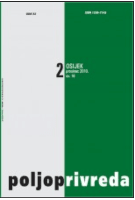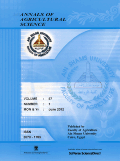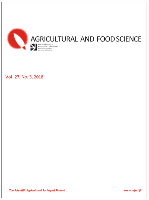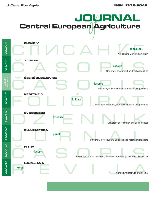
Poljoprivreda
Scope & Guideline
Elevating agricultural practices with cutting-edge research.
Introduction
Aims and Scopes
- Agricultural Biotechnology:
Research in this area includes the use of biotechnological methods to improve plant and animal varieties, assessing genetic variability and the impact of biopesticides. - Crop and Soil Management:
This encompasses studies on soil health, crop yield stability, and the effects of different agricultural practices on crop performance and quality. - Animal Husbandry and Welfare:
The journal publishes research on livestock management, including the assessment of animal health, welfare conditions, and productivity. - Sustainable Agriculture Practices:
Focus on innovative agricultural practices that promote sustainability, such as organic farming, intercropping, and the use of alternative fertilizers. - Food Quality and Safety:
Investigations into the sensory and nutritional quality of food products derived from agricultural produce, including studies on food additives and processing. - Environmental Impact of Agriculture:
Research assessing the environmental implications of farming practices, including the impact of pollutants and sustainable resource management.
Trending and Emerging
- Precision Agriculture:
There is a growing emphasis on precision agriculture technologies, including machine learning applications for geospatial prediction and monitoring of soil health. - Sustainable Livestock Management:
Research is increasingly focused on sustainable practices in livestock farming, addressing welfare conditions and environmental impacts. - Plant Protection Alternatives:
The use of biopreparations and other non-chemical methods for plant protection is becoming more prominent, reflecting a shift towards sustainability. - Nutritional Quality Enhancement:
Studies on enhancing the nutritional quality of food products, such as biofortification of crops, are gaining traction, indicating a focus on health benefits. - Environmental Resilience:
Research themes are emerging around environmental resilience in agriculture, including the impact of climate change and the adaptation of farming practices.
Declining or Waning
- Traditional Crop Varieties:
Research on traditional crop varieties and their economic viability has decreased, possibly as farmers shift towards more productive and hybrid varieties. - Chemical Pesticide Use:
There is a noticeable decline in studies focused on chemical pesticides, as there is an increasing emphasis on organic and biopesticide alternatives. - Technological Innovations in Machinery:
While still relevant, the focus on agricultural machinery and its technological advancements appears to be waning, as attention shifts towards sustainable practices.
Similar Journals

Journal of Tekirdag Agriculture Faculty-Tekirdag Ziraat Fakultesi Dergisi
Exploring the intersection of agriculture and sustainability.The Journal of Tekirdag Agriculture Faculty-Tekirdag Ziraat Fakultesi Dergisi, published by UNIV NAMIK KEMAL, represents a significant platform dedicated to the dissemination of research in the fields of agricultural and biological sciences. With an ISSN of 1302-7050 and E-ISSN 2146-5894, this journal aims to advance knowledge and innovation within its scope, which encompasses a diverse array of agricultural topics and environmental pollution. Notably, it has achieved a Q3 category ranking in Agricultural and Biological Sciences and a Q4 category ranking in Pollution for 2023, reflecting its growing influence in the academic community. Operating from Turkey, the journal publishes articles that seek to address contemporary challenges in agriculture and environmental science, thus fostering collaborations among researchers, professionals, and students worldwide. Researchers can benefit from the journal’s focus on applied sciences, providing insights and solutions pertinent to real-world issues. Engage with cutting-edge studies and contribute to this evolving field by exploring the transformative research featured within.

Journal of Agriculture and Food Research
Pioneering Research for a Sustainable Food SystemJournal of Agriculture and Food Research, published by ELSEVIER, is a premier Open Access journal that has made significant strides in the fields of agricultural and biological sciences since its launch in 2019. With an ISSN of 2666-1543, the journal is headquartered at Radarweg 29, 1043 NX Amsterdam, Netherlands. It holds a remarkable position in the 2023 Category Quartiles, achieving Q1 rankings in Agricultural and Biological Sciences (miscellaneous), Agronomy and Crop Science, and Food Science. The journal's impactful research is reflected in its impressive Scopus ranks, including a ranking of #25 in Agricultural and Biological Sciences, showcasing the journal's commitment to high-quality, innovative research relevant to contemporary agricultural challenges. Researchers, professionals, and students can benefit from its diverse array of published works, fostering a greater understanding of food security, sustainable agriculture, and innovative food technologies. By embracing an open access model, the journal ensures that critical research is readily available to a global audience, aiming to enhance knowledge dissemination in this vital field.

AgroLife Scientific Journal
Fostering Collaboration in the Agro-Scientific Community.AgroLife Scientific Journal, published by the University of Agronomic Sciences and Veterinary Medicine Bucharest, is a distinguished platform for disseminating research within the field of agricultural and biological sciences. Established as an Open Access journal since 2012, it aims to facilitate knowledge sharing and enhance accessibility to vital information in agriculture, veterinary medicine, and related disciplines. With an ISSN of 2285-5718 and E-ISSN of 2286-0126, the journal welcomes innovative research articles, review papers, and case studies that explore contemporary challenges and breakthroughs in the agro-scientific community. It is noteworthy that in the 2023 Category Quartiles, the journal is classified as Q4, reflecting its role in the broader academic landscape, though with significant growth potential as indicated by its Scopus Rank of #152 out of 193. Researchers, professionals, and students can leverage the journal's open access model to remain at the forefront of agricultural research while contributing to a collaborative scholarly conversation.

TROPICAL AGRICULTURE
Nurturing the growth of agronomic research in the tropics.Tropical Agriculture is a reputable journal dedicated to advancing knowledge and research in the fields of Agronomy and Development, with a particular emphasis on tropical farming practices and agricultural innovation. Published by the University of the West Indies, this journal serves as a crucial resource for researchers, professionals, and students engaged in the complexities of agriculture in the tropics. Established in 1979, it has witnessed significant contributions and continues to facilitate scholarly discussions through its quarterly publications. While the journal currently holds a Q4 ranking in both the Agronomy and Development categories, its commitment to fostering research excellence positions it as a pivotal platform for emerging studies and regional agricultural advancements. Although not an open-access publication, it provides critical insights and localized research that greatly benefit the agricultural community, particularly within the Caribbean context. Researchers and professionals in the field can rely on this journal for insightful content on tropical agricultural challenges and developments, enhancing knowledge dissemination and application across related disciplines.

ANNALS OF AGRICULTURAL SCIENCES
Empowering the Agricultural Community Through Open Access ResearchANNALS OF AGRICULTURAL SCIENCES, published by Elsevier, stands as a leading open access journal dedicated to the multifaceted field of agricultural sciences. Since its inception in 2011, this journal has served as a pivotal platform for the dissemination of high-quality research, covering areas such as agronomy, animal science, horticulture, food science, plant science, and soil science. With an impressive Q1 ranking across multiple disciplines and notable positions in Scopus Ranks—including #6 in Animal Science and Zoology and #3 in Horticulture—this journal is recognized globally for its significant contribution to advancing agricultural innovations. The journal caters to a diverse audience of researchers, professionals, and students, providing them with open access to cutting-edge studies that address critical issues in agricultural productivity and sustainability. Its commitment to high-impact research ensures that articles contribute meaningfully to the scientific community, fostering advancements in agricultural practices and policies.

AGRICULTURAL AND FOOD SCIENCE
Empowering research to enhance food safety and productivity.AGRICULTURAL AND FOOD SCIENCE is a prestigious journal published by the SCIENTIFIC AGRICULTURAL SOCIETY OF FINLAND, dedicated to advancing knowledge in the fields of agricultural and food sciences. With an ISSN of 1459-6067 and E-ISSN of 1795-1895, this open-access journal has been providing valuable insights and research findings since its inception in 2002. As of 2023, it holds a Q3 ranking in Food Science and is positioned at the 46th percentile within its Scopus category, ranking 210 out of 389 journals in Agricultural and Biological Sciences – Food Science. The journal features contributions from a global network of researchers, covering various topics including sustainable agricultural practices, food safety, and innovative food technologies. Based in Finland, the journal serves as an essential platform for scholars, professionals, and students who are committed to enhancing food security and agricultural productivity through rigorous scientific research. The convergence of interdisciplinary studies from 2004 to 2024 marks a critical evolution in the scope of agricultural and food research, making this journal a vital resource for anyone involved in these dynamic fields.

AGROCIENCIA
Exploring the intersection of agronomy and sustainability.AGROCIENCIA, published by COLEGIO POSTGRADUADOS, is a key journal in the fields of agronomy, animal science, and environmental science in Mexico. With an ISSN of 1405-3195 and an E-ISSN of 2521-9766, this journal has been a crucial platform for disseminating research findings since its inception in 2000. Operating from Montecillo, Estado Mexico, it provides an outlet for scholars and practitioners to share innovations and insights that directly impact agricultural practices and environmental sustainability. Despite its current categorization in the Q4 quartile across multiple disciplines, AGROCIENCIA strives to elevate the quality and reach of research, fostering a collaborative approach to tackle pressing issues within the agricultural sciences. Access options are primarily through institutional subscriptions, allowing for a diverse audience of researchers, professionals, and students to engage with the latest studies aimed at advancing knowledge in the agricultural sector. As the journal converges towards its 2024 milestone, it remains dedicated to enhancing scientific inquiry and promoting effective solutions within its discipline.

SPANISH JOURNAL OF AGRICULTURAL RESEARCH
Nurturing Ideas for Enhanced Agricultural ProductivityThe Spanish Journal of Agricultural Research (ISSN: 1695-971X, E-ISSN: 2171-9292), published by the prestigious Consejo Superior Investigaciones Cientificas (CSIC), serves as a vital resource for those engaged in the fields of agronomy and crop science. Established as an Open Access journal since 2003, it aims to foster the dissemination of innovative research and practical applications related to agricultural practices and sustainability. With its Q3 category in Agronomy and Crop Science and a Scopus ranking of #224 out of 406, the journal provides an accessible platform for scholars to share valuable findings that enhance agricultural productivity and environmental stewardship. Covering research from 2006 to 2024, this journal continues to be instrumental for researchers, professionals, and students eager to remain at the forefront of agricultural science advancements.

PAKISTAN JOURNAL OF AGRICULTURAL SCIENCES
Exploring Agricultural Frontiers for a Sustainable FutureWelcome to the Pakistan Journal of Agricultural Sciences, a prominent platform for disseminating vital research findings in the fields of agronomy, crop science, food science, plant science, and soil science. Published by the prestigious University of Agriculture in Faisalabad, this journal aims to enhance the scientific discourse surrounding agricultural innovation and sustainability in Pakistan and beyond. With an ISSN of 0552-9034 and E-ISSN of 2076-0906, the journal serves as a valuable resource for researchers, professionals, and students interested in cutting-edge agricultural developments. As of 2023, the journal is ranked in the Q3 category for Agronomy and Crop Science as well as Food Science and positioned in Q4 for Plant and Soil Science, highlighting its growing impact within a competitive academic landscape. While the Pakistan Journal of Agricultural Sciences is not currently open access, it provides a comprehensive archive of research converging from 2011 to 2024, ensuring that critical knowledge remains accessible to those striving to advance the agricultural sciences. Join us in our mission to foster innovation and support sustainable practices in agriculture.

Journal of Central European Agriculture
Connecting Researchers to Transform Central European AgricultureThe Journal of Central European Agriculture, with ISSN 1332-9049 and E-ISSN 1332-9049, is an esteemed platform published by UNIV ZAGREB, FAC AGRICULTURE that caters to the dynamic fields of agronomy, crop science, and animal science. Since its establishment in 2000, this Open Access journal has played a crucial role in disseminating critical research findings while fostering collaboration among academics, researchers, and professionals within the agricultural community. The journal, which is based in the heart of Croatia, spans a rich history of scholarship, with its content available for free to readers and contributors alike. As reflected in its current standings, the journal has achieved a Quartile 3 ranking in Agronomy and Crop Science and Quartile 4 in Animal Science and Zoology for the year 2023, indicating its growing influence within these disciplines. With Scopus ranks placing it in the 32nd percentile among its peers, the Journal of Central European Agriculture is committed to advancing agricultural sciences not only in Central Europe but globally as it prepares for its converged years from 2007 through 2024. This journal serves as a vital resource for innovative research, practical applications, and a deeper understanding of agricultural challenges and solutions.